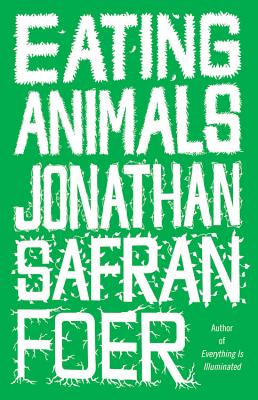
Award-winning author Jonathan Safran Foer took the stage at 6th & I Synagogue in Washington Tuesday night to discuss his latest book and first work of non-fiction, "Eating Animals."
The book addresses the ethics of animal agriculture and the mainstream American diet from a personal and often emotional perspective. A vegetarian since childhood, Foer discussed the morality of eating meat prepared by what many consider a warped and environmentally destructive system.
Foer often relies on his Jewish upbringing to articulate how tradition and family enter the equation (his grandmother, who is the subject the book’s first chapter, was even sitting in the audience). Despite the book’s strong narrative elements and the author’s background in fiction, Foer adamantly stressed that “as far as nonfiction goes, this is very nonfictional.”
In classic Jewish fashion, the event was kicked off by Foer‘s unmistakably proud mother, Esther Safran Foer. But it wasn’t just a chance for her to kvell; the elder Foer serves as the executive director of 6th & I, a synagogue that has gained cross-cultural appeal by holding a wide range of events in its sanctuary, including rock concerts, comedy tours and of course, book talks.
“I knew Jonathan before he was a reader and before he was a writer,” she said to two floors of jam-packed pews. “I even knew him when he was a vegetarian for the very first time at 9. And as many of you know, I’m his mother, so I can say these things.”
Foer was then introduced by Andrew Sullivan, former editor of The New Republic, blogger and Foer admirer. Sullivan cited his esteem for Eating Animals, noting that the book had touched upon concerns with which he himself grappled.
“To see what is in front of one’s nose is a constant struggle,” Sullivan admitted before ceding the stage to Foer amid loud applause.
Despite the touchy nature of his chosen subject, Foer laid off the sermonizing. The issue of ethical eating is best broached “not by a lecture, not by a reading and certainly not by an argument.” Rather, Foer spent his hour and change at the podium by taking questions from what seemed to be a veggie-friendly audience.
Though he did not advocate vegetarianism (“We don’t have to become vegetarians . . . [that] implies that we have to do everything or nothing.”), Foer emphatically emphasized the necessity of reforming the meat industry and consumer awareness. Knowing where your meat comes from, said Foer, is essential.
In addition to citing the prevalence of animal cruelty, Foer noted that according to recently released figures by a World Bank-affiliated magazine World Watch, animal food production is responsible for about 51% of all Greenhouse Gas emissions.
One question addressed the place of hunting in the ethical eating debate, highlighting the argument that hunters are closer to their food source and therefore present an ethical alternative to buying store bought meat.
Foer dismissed this assertion, saying “I don’t think that’s why people hunt.” He stressed that people who choose to hunt are not hunting to eat – they eat what they hunt, an important distinction.
“These are people who I’m sure have access to supermarkets . . . it thrills them to kill things,” said Foer. “Any other explanation is disingenuous, it’s not true.”
The mood took a more lighthearted turn when Foer was asked his thoughts on where Judaism stands on hunting. To this, he responded, “Jews don’t recoil from hunting for ethical reasons, but more that, like, it’s feh.”
The loud guffaws heard across the sanctuary suggested this was an audience familiar with the Yiddish exclamation.
Whether or not audience members were convinced by Foer’s argument, it seemed as though he had given them food for thought. Regardless of their opinion of "Eating Animals," Foer asked them to “act on [their] values, even when it’s not convenient, when it’s more expensive, when it’s socially awkward.”
The event, which was co-sponsored by 6th & I and local DC independent bookstore Politics & Prose, concluded with a book signing and light vegetarian desserts.
JTA has documented Jewish history in real-time for over a century. Keep our journalism strong by joining us in supporting independent, award-winning reporting.





